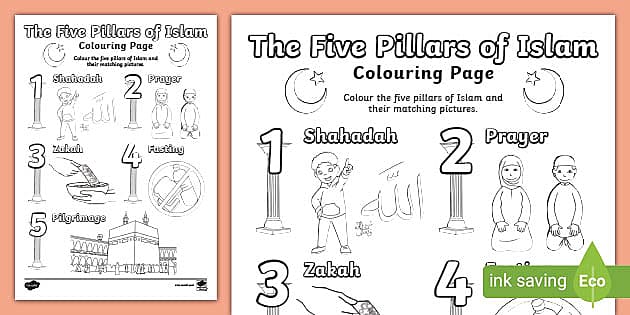Ever wondered what binds together the diverse Muslim community across the globe? What foundational principles guide their faith and daily life? The answer lies in the Five Pillars of Islam – a set of tenets that serve as the bedrock of Islamic belief and practice.

Image: mungfali.com
This worksheet is your guide to diving deep into the Five Pillars. It will not only enhance your understanding of Islam but also provide valuable insights into its core values and how they impact the lives of millions worldwide.
What are the Five Pillars of Islam?
The Five Pillars of Islam are the fundamental obligations for all Muslims. They are:
- Shahada (Declaration of Faith): The belief in the oneness of God (Allah) and the prophethood of Muhammad (peace be upon him). This is the cornerstone of Islam, marking the entry point into the faith.
- Salah (Prayer): Muslims perform five daily prayers at specific times throughout the day. It is a direct connection with God, a moment of reflection, and a pillar of devotion.
- Zakat (Alms-Giving): Giving a portion of one’s wealth to the poor and needy. This acts as a purification of wealth, fosters social justice, and strengthens the bond between the wealthy and the less fortunate.
- Sawm (Fasting): Muslims abstain from food and drink during the month of Ramadan. This spiritual discipline cultivates empathy, self-restraint, and a deeper connection with God.
- Hajj (Pilgrimage): A journey to Mecca, Saudi Arabia, performed at least once in a lifetime by those who are physically and financially able. This spiritual journey unites Muslims from all corners of the world in a shared act of worship.
Exploring the Five Pillars: A Deeper Dive
1. Shahada: The Foundation Stone
The Shahada, simply put, is the declaration “There is no god but Allah, and Muhammad is the messenger of Allah.” This concise statement encapsulates the core belief of Islam, acknowledging Allah as the sole Creator and accepting Muhammad as His final prophet. It’s not merely a phrase; it’s a commitment to a way of life, a surrender to divine will.

Image: animalia-life.club
2. Salah: Connecting with the Divine
Salah is a cornerstone of everyday Muslim life. Practiced five times a day at specific times – Fajr (dawn), Dhuhr (noon), Asr (afternoon), Maghrib (sunset), and Isha (night) – Salah allows Muslims to connect with the Almighty through physical postures and recited prayers. This ritualistic act cultivates humility, self-reflection, and fosters a sense of tranquility and inner peace.
Salah is performed in a designated space, facing the Kaaba in Mecca, and consists of specific postures like standing, bowing, prostrating, and sitting. The prayers involve reciting verses from the Quran, seeking forgiveness, and expressing gratitude.
3. Zakat: Sharing with the Needy
Zakat, literally meaning “purification,” is an obligatory act of giving a predetermined portion of one’s wealth to the poor and needy. It serves as a purification of wealth, reminding individuals that their prosperity is a trust from Allah to be shared. Zakat goes beyond charity – it is a fundamental system of social justice, ensuring financial equity and alleviating poverty within the Muslim community.
4. Sawm: Spiritual Discipline
Fasting during the month of Ramadan is a deeply spiritual practice, where Muslims abstain from food, drink, and sexual relations from dawn to sunset. This physical discipline fosters self-restraint, empathy, and a deeper connection with God. It brings Muslims closer to the experience of those less fortunate, emphasizing compassion and gratitude.
Beyond the physical act, Ramadan is a time for spiritual reflection, increased prayer, charity, and seeking forgiveness. It fosters a spirit of community, with families and friends coming together for meals, prayers, and social gatherings.
5. Hajj: A Journey of Unity
Hajj, the pilgrimage to Mecca, is a once-in-a-lifetime journey undertaken by physically and financially able Muslims. It is a symbolic reenactment of Prophet Abraham’s journey, symbolizing a commitment to God and forging a sense of unity among Muslims worldwide. During Hajj, millions of Muslims converge in Mecca, performing specific rituals like circumambulating the Kaaba, running between Safa and Marwa, and standing on the Plain of Arafat.
Hajj signifies a profound spiritual, emotional, and physical experience, reminding Muslims of their common humanity and the shared bond of faith. It transcends social and economic boundaries, unifying believers from different backgrounds and cultures under the banner of Islam.
Using the Five Pillars Worksheet
This worksheet serves as a valuable resource for deepening your understanding of Islam. Use it as a tool for:
- Personal Exploration: Reflect on each pillar’s meaning and significance in your life. How does each pillar impact your personal beliefs and practices?
- Interfaith Dialogue: Use the worksheet as a starting point for conversations with individuals from different faiths. Explore commonalities and differences in perspectives.
- Educational Tool: Share the worksheet with others as a simple guide to understanding the basics of Islam. It can be a helpful resource for schools, community centres, or religious groups.
Five Pillars Of Islam Worksheet Pdf
Conclusion: Understanding Islam through its Pillars
The Five Pillars of Islam provide a clear framework for understanding the foundation of the faith. These principles are more than just rituals; they represent a way of life, encompassing a commitment to belief, worship, social responsibility, self-discipline, and the unity of the Muslim community. Through this worksheet, we hope you’ve gained valuable insights into the essence of Islam and the profound impact the Five Pillars have on the lives of Muslims around the world.





